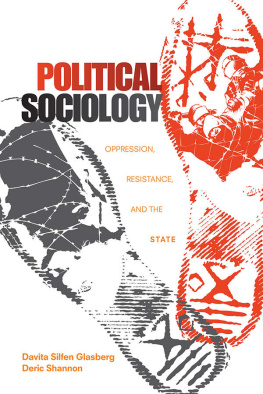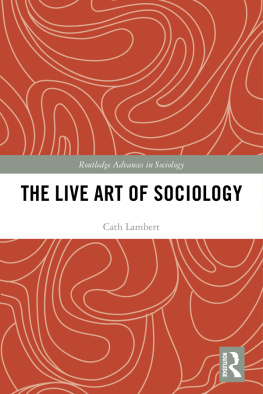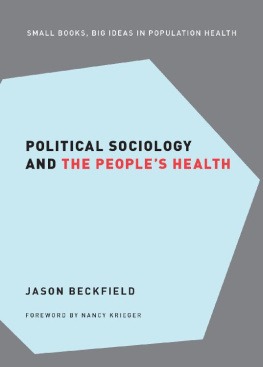Davita Silfen Glasberg - Political Sociology
Here you can read online Davita Silfen Glasberg - Political Sociology full text of the book (entire story) in english for free. Download pdf and epub, get meaning, cover and reviews about this ebook. year: 2010, publisher: SAGE Publications, genre: Politics. Description of the work, (preface) as well as reviews are available. Best literature library LitArk.com created for fans of good reading and offers a wide selection of genres:
Romance novel
Science fiction
Adventure
Detective
Science
History
Home and family
Prose
Art
Politics
Computer
Non-fiction
Religion
Business
Children
Humor
Choose a favorite category and find really read worthwhile books. Enjoy immersion in the world of imagination, feel the emotions of the characters or learn something new for yourself, make an fascinating discovery.
- Book:Political Sociology
- Author:
- Publisher:SAGE Publications
- Genre:
- Year:2010
- Rating:4 / 5
- Favourites:Add to favourites
- Your mark:
- 80
- 1
- 2
- 3
- 4
- 5
Political Sociology: summary, description and annotation
We offer to read an annotation, description, summary or preface (depends on what the author of the book "Political Sociology" wrote himself). If you haven't found the necessary information about the book — write in the comments, we will try to find it.
Political Sociology — read online for free the complete book (whole text) full work
Below is the text of the book, divided by pages. System saving the place of the last page read, allows you to conveniently read the book "Political Sociology" online for free, without having to search again every time where you left off. Put a bookmark, and you can go to the page where you finished reading at any time.
Font size:
Interval:
Bookmark:
POLITICAL
SOCIOLOGY
SOCIOLOGY
AND THE STATE
Davita Silfen Glasberg
University of Connecticut
Deric Shannon
University of Connecticut

Copyright 2011 by Pine Forge Press, an Imprint of SAGE Publications, Inc.
All rights reserved. No part of this book may be reproduced or utilized in any form or by any means, electronic or mechanical, including photocopying, recording, or by any information storage and retrieval system, without permission in writing from the publisher.
For information:
 | Pine Forge Press An Imprint of SAGE Publications, Inc. 2455 Teller Road Thousand Oaks, California 91320 E-mail: | SAGE Publications India Pvt. Ltd. B 1/I 1 Mohan Cooperative Industrial Area Mathura Road, New Delhi 110 044 India |
| SAGE Publications Ltd. 1 Olivers Yard 55 City Road London EC1Y 1SP United Kingdom | SAGE Publications Asia-Pacific Pte. Ltd. 33 Pekin Street #02-01 Far East Square Singapore 048763 |
Printed in the United States of America
Library of Congress Cataloging-in-Publication Data
Glasberg, Davita Silfen.
Political sociology : oppression, resistance, and the state / Davita Glasberg, Deric Shannon.
p. cm.
Includes bibliographical references and index.
ISBN 978-1-4129-8040-1 (pbk.)
1. Political sociology. 2. Oppression (Psychology). 3. Social movements. I. Shannon, Deric. II. Title.
| JA76.G54 2011 | |
| 306.2dc22 | 2010040661 |
This book is printed on acid-free paper.
10 11 12 13 14 10 9 8 7 6 5 4 3 2 1
| Acquisitions Editor: | David Repetto |
| Associate Editor: | Julie Nemer |
| Editorial Assistant: | Maggie Stanley |
| Production Editor: | Karen Wiley |
| Copy Editor: | Megan Markanich |
| Proofreader: | Penelope Sippel |
| Typesetter: | C&M Digitals (P) Ltd. |
| Indexer: | Maria Sosnowski |
| Cover Designer: | Gail Buschman |
| Marketing Manager: | Erica DeLuca |
| Permissions Editor: | Karen Ehrmann |
I nterest in political sociology has ebbed and flowed with the intensity of political events. Keen interest piqued during the Vietnam War and its aftermath, waned somewhat during the Reagan years, and now appears to be resurging once again in the wake of the terrorist attacks of September 11, 2001, and the subsequent wars in Iraq and Afghanistan and the presidential election process of 2008. The severe global recession of 2008 through 2010 has also grabbed the attention of many people eager to understand how and why such a significant economic and political quake could happen and arguably galvanized the likes of the Tea Party movement in the United States. Indeed, the current wave of interest began well before the September 11 attacks: The American Sociological Associations Guide to Graduate Departments of Sociology lists 52 graduate-degree-granting institutions as offering political sociology as one of their specialties. Political sociology has one of the largest section memberships of the American Sociological Association. And student interest, at both the graduate and undergraduate levels, appears to be increasing. Political sociology is identified by many of the top graduate programs in sociology as one area of graduate qualifying examination taken by a significant number, if not a majority, of students. These suggest a rising demand for materials to teach political sociology.
Oddly enough, there is a frustrating limitation of political sociology textbooks available, and those that are currently in print do a variable job of covering the main theoretical currents and empirical research issues one would need to cover when teaching such a course. Further, while the study of the intersections of race, class, gender, and sexualities is increasingly a focus in sociology, none of the existing textbooks deals with these as important relative to a study of political sociology. In addition, questions of compliance and resistance are not satisfactorily covered. The question of how we may come to accept and comply with the interests of dominants in society, even when this may contradict our own interests, is at least partially explained by exploring issues and processes of political socialization. However, this is often left unexplored. And while social movements are often understood among sociologists to be an important organizational mechanism used by those with relatively little power to resist and challenge power structures, existing textbooks devote variable attention to its analysis. Without a focused examination of social movements, students may be left with an overriding belief that power structures are inexorable and unchangeable, a conclusion many sociologists would be loathe to encourage in our students.
Finally, theoretical perspectives in political sociology largely frame their analyses on class-based concepts and issues of power and the state. None of them explore the question of multiple oppressions. But how do we understand oppression beyond class-based oppression? Are the prevalent models of class-based theories of power and the state sufficient, such that we simply need to add and stir concepts of gender, racialization, and heteronormativity for insight? Or is there a need to reconceptualize our framework and develop a more flexible view of the relationship among the state, society, and oppression that enables us to understand multiple oppressions? This book explores possible ways to respond to these questions.
The book is intended for use in political sociology courses as well as sociology courses in race, class, and gender and theories of the state. It may serve as a comprehensive text for the courses or as a core text to be supplemented with other readings and materials (such as videos, for example). It can also be used as a monograph in addition to other monographs. Students who take most of these courses are commonly juniors and seniors (students in Sociology of Race, Class, and Gender commonly are also first-year students and sophomores) majoring in sociology, political science, history, anthropology, peace studies, womens studies, African American studies, Asian American studies, Latino studies, labor studies, and philosophy. They have usually taken an introductory sociology, social problems, or political science course as preparation. This book is intended to help students develop a wide array of concepts and theoretical perspectives so that they may analyze and understand new developments in the world around them after they leave the course. It also intends to propose a multidimensional view of the relationship among the state, society, and oppression and inequality that blends elements of the prevalent theories of power and the state. That proposed view allows for greater analytical flexibility to better understand gendered, racialized, and heteronormative relationships as well as the more commonly explored class-based relationships among the state, society, and multiple oppressions.
The central theme of the book is the interplay among power, inequality and multiple oppressions, and the state. That is, the book takes critical issue with the idea that power is random, dispersed, and shared by all so that any one interest at any point in time may rise to have its interests met. Instead, the book focuses on the structure of power and inequality to examine the
Next pageFont size:
Interval:
Bookmark:
Similar books «Political Sociology»
Look at similar books to Political Sociology. We have selected literature similar in name and meaning in the hope of providing readers with more options to find new, interesting, not yet read works.
Discussion, reviews of the book Political Sociology and just readers' own opinions. Leave your comments, write what you think about the work, its meaning or the main characters. Specify what exactly you liked and what you didn't like, and why you think so.













